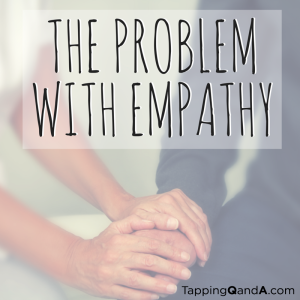 [Note: Last change for the 40% the Advanced Tapping Training go here http://bit.ly/gatherdeal]
[Note: Last change for the 40% the Advanced Tapping Training go here http://bit.ly/gatherdeal]
One of the keys to being an emotionally intelligent human being is understanding what the people around us are feeling and experiencing.
This skill can be particularly useful when we are helping and caring for others.
When it comes to emotional intelligence there is a big difference between empathy and sympathy. Both are can be useful, but for us to be healthy we need to understand the difference between the two and when each is appropriate.
In this podcast we explore the difference between these two approaches, the consequences for using the wrong one, and how to be present in a healthy way to loved ones and clients.
I would love to hear your experience of how you have been successful and unsuccessful with this issue in your own life.
First, congrats on 6 years, and thank you! I have been helped many times by your wisdom and expertise and guests.
Today’s podcast 160 was super. Information I have known, but I was reminded the importance of empathy and sympathy in the appropriate places. The quick sand example was so helpful.
And another thought I had: clients can very vulnerable and empathy opens them and us as practioners to unhealthy closeness in an emotional relationship rather than sympathy which keeps a better perspective on the issues of the client.
Bless you Gene and Thank you,
Jeanne
I fully agree it is so true that we as counsellors must keep to border lines. If every traumatized person I minister to becomes my story it will ruin me soon. I think the big skill is in ministering to people that they feel they are the only client we pay attention to where as we know its not. I am in the ministry to unprivileged children and youth in South Africa. I love to listen to your insight and appreciate your passion for inner healing. Proverbs 4:23
Hi Gene, In England empathy means both experiencing, appreciating AND understanding the emotions of another, but without necessarily having had the experience yourself.
Whilst sympathy means feeling sorry and pitiful for that person.
And sympathy between two people means they have a common understanding.
So for us, unhealthy empathy is over feeling with someone. (I would say you take on their energy) And healthy empathy is understanding and appreciating ( Without taking on their energy). And sympathy is an emotion which may lead you into action, but is largely inactive and negative, because you feel pity for some of their woes, without necessarily having an understanding. As in I feel sympathy for that homeless person (as I don’t want to be homeless). But I have no empathy as to why they have arrived at that place (drugs,abuse, general hopelessness) or an empathy of how they feel (cold, alone, lonely)…. Does that make sense?
Cheers, Biddy
This is a prefect example of the words we use need to be seen through the context and culture we live in.
Thanks for sharing the UK distinction.
The concept is the same, but you just need to find the right words to describe it for you.
I first learned of the difference when reading about non violent communication from the psychologist Marshall Rosenberg. What I took from what I read was that sympathy was the more enmeshed variety and empathy was the more understanding but not taking on the emotion as much. Dictionary definitions are not perfectly clear, but I saw commiseration as a definition of sympathy a couple times.